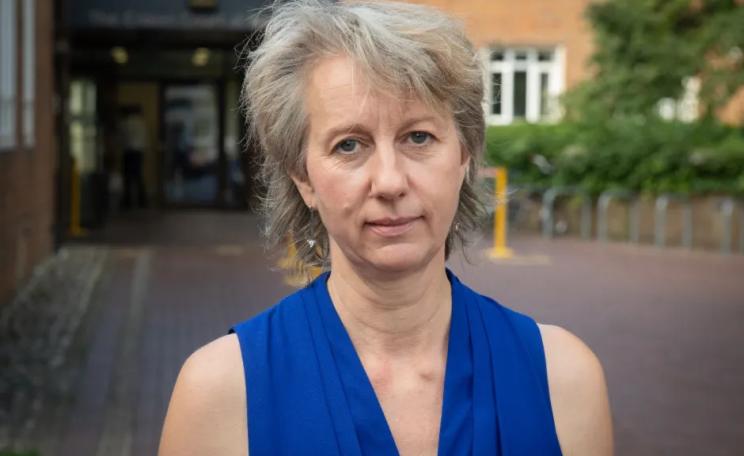We need citizen mobilisation across all parts of society—now—to ensure we act on nature and climate in a way that’s equitable, inclusive and just.
A blueprint for survival – where have we heard that phrase before? Long-standing readers of this publication may recall that, 52 years ago, The Ecologist Vol 2, No 1 was given over to a detailed analysis of the possible "breakdown of society and the irreversible destruction of the life-support systems on this planet” and to the development of a strategy for change.
The authors of the Blueprint for Survival hoped for the dawn of a new age in which us human beings "will learn to live with Nature rather than against it.” A Penguin Special of the same title followed, taking the message to a much wider readership.
Fast forward half a century and what has changed? We are still faced with unsustainable growth, and the destruction of nature has become ever more severe.
Unlawful
But now climate breakdown, scarcely mentioned in Blueprint, has been added to the toxic mix. Fifty years of steadily rising temperatures and more frequent extreme weather events have compounded the issues that we face.
Blueprint warned that governments are either refusing to face the relevant facts or are briefing their scientists in such a way that their seriousness is played down.
Fifty years on, the inadequacy of the current UK Government’s climate strategy led to the courts, where it was deemed unlawful; continual u-turning on climate action shows again that nothing has really changed.
This has been highlighted time after time by many agencies, including the government's own advisory bodies. Recent reports by the Office for Environmental Protection and the Climate Change Committee are the latest in a long list of “must do better” exhortations.
Peril
Meanwhile, as we await the announcement of a general election, a hopeful Climate and Nature Bill has been introduced to Parliament. Zero Hour is the campaign behind the bill that will, if enacted, address climate change and the nature crisis in a coordinated way and in line with the most up-to-date science.
The bill received its first reading in the House of Commons on 21 March 2024. Alex Sobel MP, who introduced the Bill, said: “I’m proud to have introduced the Climate and Nature Bill with cross-party support from MPs of all main parties. This joined-up climate and nature plan is continuing the legacy of the Climate Change Act 2008.
"This CAN Bill is needed if we want to reclaim our environmental leadership; and finally get serious about reducing energy bills, protecting our wildlife, creating green jobs, and bolstering our energy and food security.
“When made law, the CAN Bill will set the UK on a path where we can properly tackle the interconnected climate and nature crises—whilst making sure that no one is left behind in the long-overdue just transition we need. Global emissions are rising. Nature is in peril.
We need citizen mobilisation across all parts of society—now—to ensure we act on nature and climate in a way that’s equitable, inclusive and just.
He added: "So in this pivotal election year, let’s align our climate and nature laws in line with the science—and our international agreements—and deliver the climate and environmental action the public are crying out for.”
Mobilisation
The Climate and Nature Bill has been gaining support in Parliament and amongst the wider public since Caroline Lucas MP first introduced it into the Commons in 2020. The CAN Bill now represents the largest environmental caucus of cross-party MPs and Peers with 180 parliamentarians backing the proposal.
Although many private members bills (PMBs) are used to raise awareness of an issue, rather than as a route to new legislation, there are many precedents where PMBs have become law - not least, the Climate Change Act (2008) itself.
Creating publicity and mass mobilisation around the bill, while building support inside parliament, puts pressure on the government of the day to take up the bill for itself, and the Climate Change Act was passed under the last Labour government.
The proposed legislation deals with our cumulative emissions, by cutting them rapidly now before the door completely closes on 1.5°C. The bill includes a clause to end new fossils fuels and makes sure that the UK does its proportionate share to cut global emissions in the last possible window to keep global heating close to 1.5°C. This would give us a chance to avoid the worst impacts of climate change.
While the existing Environment Act (2021) only aims to halt the decline of nature by 2030, the bill also commits to bending the curve and setting nature on the pathway to recovery by 2030, in line with the international agreement made at the UN Biodiversity Summit COP15 in 2022. And it would make sure that the UK takes account of its ecological footprint and all of the damage we cause to nature through our supply chains.
Pathway
Weaning ourselves off fossil fuels and freeing up enough land to boost biodiversity means big changes. So it’s important that the public is on board and understands the options that we have.
The CAN Bill calls for a Climate and Nature Assembly to help develop an emergency strategy, to set a comprehensive, joined-up roadmap for the UK to deal with the interconnected climate and nature crises - giving a clear direction to politicians, councils, businesses and the public alike.
The bill has been written by world-leading scientists and is backed by 200 climate scientists, ecologists, conservationists and others, including Professor Sir David King, the former Government Chief Scientist, Professor Kevin Anderson from the University of Manchester, Professor EJ Milner Gulland from Oxford University, Professor Joanna Haigh from Imperial College London and Professor. Nathalie Pettorelli from the Zoological Society of London.
More than 500 organisations are already signed up, including groups as diverse as Friends of the Earth, Greenpeace, Oxfam, Ecosia, the Cooperative Bank, the Nature Friendly Farmers’ Network and the National Federation of Women’s Institutes. And 354 city, town and parish councils have passed motions in support - from Norwich to Newcastle and Devon to Derbyshire.
Zero Hour has launched an election adjacent campaign, The Nation Needs You!, with broadcaster and environmentalist Chris Packham, Dragons Den’s Deborah Meaden and activist Tori Tsui. Tsui has said: “We need citizen mobilisation across all parts of society—now—to ensure we act on nature and climate in a way that’s equitable, inclusive and just.”
We cannot afford to wait another 50 years for real action on the climate and nature crises. As the American environmentalist Bill McKibben has said: “The argument is over, the science is clear. What we’re having now is a fight. And the fight, like all fights, is about money and power. Our job is to build movements big enough to shift that balance of power.”
This Author
David Venner graduated in ecological sciences in 1972, the year is which The Blueprint for Survival was published. After a career in countryside management and practising rural crafts, he now helps to manage a community woodland and is active with the North Devon group of Extinction Rebellion. The author acknowledges input from Dr Amy MacDonnell of Zero Hour in preparing this article.
This Campaign
To support the Zero Hour campaign visit www.action.zerohour.uk. Enter your postcode and you’ll find your Constituency Action Page, which shows how many individuals and local organisations are mobilising in your local area, and calls on your next MP to back the bill. Please sign to indicate your support for the campaign. Also ask friends, family, colleagues and local businesses and community groups to do the same. It works - already 15 per cent of election candidates are backing the CAN Bill. If you’d like to get more involved, you can also join the campaign WhatsApp group or get together with other local people at campaigner check-in sessions.




